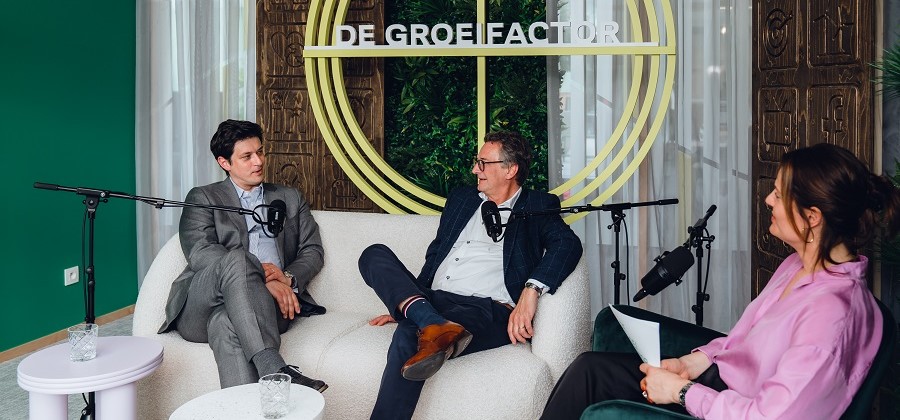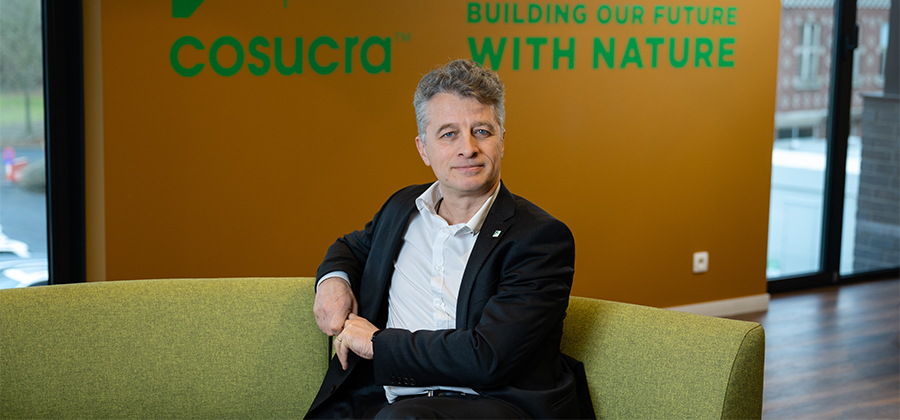Are Belgian companies entering the digital age? Are they restructuring or opting for engagement and training? The results of a poll by BNP Paribas Fortis.

When Koen De Leus, Chief Economist at BNP Paribas Fortis, came up with the idea for his book 'The Winners' Economy’, released mid-2017, he started a study which indicated that 4 companies in 5 believed they already had a plan to prepare for the digital age, or had already taken steps. The rate was two times lower in the industrial sector, which this particular revolution is hitting more slowly. Where are we at now?
The majority have invested in digital technology
Digital progress is well underway in most companies. Over the past 2 years, 94% have expanded their information technology budget and four companies out of every five intend to develop it further over the coming years. This is good news even if, for over one third of companies, it is essentially just a source of extra costs.
In a positive sign after 10 years of continuous reductions in productivity, half of companies are seeing increased effectiveness once again: this is a good thing for the Belgian economy's long-term growth potential, emphasises Koen De Leus.
Nonetheless, opinions on the subject are divided. 33% of the companies surveyed still say that they are not yet ready for the digital revolution. The same goes, they say, for half of their suppliers and customers.
A source of employment?
Three quarters of companies say that they have engaged more with the topic in the past two years. However, there is a recruitment challenge, reportedly due to the lack of employees skilled in ICT.
Furthermore, one company in four says that they have carried out restructuring measures and cut jobs and that this will continue for many years yet.
Education, training?
It is clear that the educational system needs to adapt. Inhouse training is desirable to help employees acquire new skills. Over half of the companies surveyed have increased their training budget. Continuous training should help some businesses avoid losing out in the digital age
Regulation - mixed opinions
What about the effects on competition? Will digital giants reap most of the benefits? Will a new anti-trust law be a good thing ? 61% of companies think so. An additional 30 percent believe the law only needs slight modification. And then there are those who believe regulation should be relaxed further...
09.12.2024
Managing business uncertainty with BNP Paribas Fortis
Every entrepreneur will tell you that financial markets are unpredictable, entailing inherent risks. We provide tailored solutions to protect your business as you navigate these volatile markets.
Whether you’re a small or large business, operating domestically or internationally, one thing is certain: if you enter a market and do your utmost to grow your business, sooner or later there inevitably will come a time when you expose yourself to risks. Frédéric Raxhon, Head of FI Midcap Sales, BNP Paribas Fortis Transaction Banking, is our go-to expert. Here, he explains how BNP Paribas Fortis helps customers manage this uncertainty.
Raxhon knows how market volatility can impact the daily operations of small, medium and large enterprises. Thanks to his experience of working as a banker in corporate finance, shares and derivatives, and advising holding and listed companies, he understands how the market works like no other.
Raxhon: "We are keenly aware that price uncertainty, in the form of volatility on the financial markets, can have a serious impact on the operations and profitability of businesses. That’s why we constantly monitor the markets and their volatility: if prices fluctuate sharply, our customers run the risk of buying high and selling low. The past few years are a good example of what can happen, with a sudden rise in interest rates, an energy crisis with very volatile prices, and a sharp rise in inflation. We will continue to see volatility in these markets, due to geopolitical tensions and ongoing wars. However, elections can also cause volatility, as they often cause a change in economic policy. President-elect Donald Trump has already said that he will hike tariffs on goods coming from outside the U.S., which will have an impact on global growth and inflation. The transition to a more sustainable society because of the energy transition, however positive this may be, is also a source of uncertainty. Companies will be required to make significant investments, and it is not yet clear which technologies will prevail.
All of these factors show that companies need guidance in the form of a tailor-made solution to ensure that volatile markets minimise the impact on their operations so that they can focus on their core business."
Solution-oriented
The solution to this volatility comes from a partner who is a market leader when it comes to safeguarding national and international business.
Raxhon: "At BNP Paribas Fortis, this often means managing the risks of companies that have a number of straightforward wishes: they want to conduct business on a daily basis without unnecessary complications; buy at a stable price where possible; pay wages in a stable environment; sell to customers with a profitable, stable margin, and so on. If they experience market uncertainty in their business operations, we are there to advise them and suggest solutions in different scenarios. This can range from companies that want stability when buying or selling goods in another currency, to controlling fluctuating interest rates on current or future loans, or even creating a stable financial environment in which they can steadily pay their wages. We also hedge raw materials: companies that require large quantities of energy, metal, or wheat, for example – just a few of the commodities that are subject to price fluctuations – can rely on our expertise to turn their uncertainty into certainty. When companies are calculating their budgets for the coming years at the end of the year, assumptions about budgets and costs are a factor that future markets do not take into account. This, in turn, could lead to inconsistencies in business operations during the next financial year. We regularly suggest solutions for this, which inject trust into the entire process. We help entrepreneurs make their business more resilient to market fluctuations. Because at BNP Paribas Fortis, we are always focused on finding solutions, in any given scenario."
International intelligence
Belgian companies are increasingly expanding their horizons, which is why an international perspective is so crucial.
Raxhon: "Everything is intricately connected in the economic space. The energy crisis, for example, was not a national crisis. In Belgium, electricity prices were directly impacted by the drop in nuclear power production in France in 2022. The American elections have a direct impact on international business, with anxiety gripping investors and the markets. And I can give you many more examples.
Moreover, we expect this interdependence and volatility to continue for quite some time: there are a large number of economic and global trends that are feeding this uncertainty. And that is why it is so important that we keep up with developments in this uncertain global environment. At BNP Paribas Fortis, we rely on a global network of experts who are always on the lookout for the latest updates. Whatever happens and wherever it happens, there are always people from our bank on the ground who monitor the situation and provide us with real-time advice on how best to inform our customers. This network has proven its worth time and again, both for us and our customers."
10.06.2024
Electronic invoicing between companies to become mandatory
The bill to introduce this obligation in Belgium has been submitted to the Federal Parliament. If the draft bill is approved, B2B e-invoicing will become mandatory from 1 January 2026. Our experts explain why Belgium wants to introduce these new rules, what the implications are for your company and how we can better support you.

“The bill is consistent with international developments and initiatives at the European level,” says Nicolas De Vijlder, Head of Beyond Banking at BNP Paribas Fortis. "Europe's ambition is a harmonised digital standard. Structured e-invoicing between companies will also reduce the administrative burden of invoicing, enabling companies to work more efficiently and increase their competitiveness. The automation of VAT declarations will also help governments prevent tax fraud and adjust economic policies based on more qualitative data.”
Evolution rather than a revolution
“The new legislation is an evolution rather than a revolution,” adds Erik Breugelmans, Deputy Managing Director at BNP Paribas Factoring Northern Europe. "Digitalisation is becoming pervasive at all levels of society, as we have seen with the increase in electronic payments, as well as the additional obligations in recent years regarding electronic invoicing to the government. In this sense, the bill for mandatory electronic invoicing between companies is a logical next step. Our bank is happy to contribute to this process, although we do not intend to offer the same services as accounting software or fintechs. However, we are happy to help our customers with payments and financing."
The impact on businesses
“Customers need to be aware that the new regulations will have an impact on their internal and external processes,” continues Erik Breugelmans. "The majority of Belgian companies mainly serve an international market, which means that the introduction of electronic invoicing will be more complex for them than for companies operating in the domestic market. As the legislation will be introduced in one go, they need to start preparing now."
“The new rules will affect a company’s accounting department as well as its IT department,” emphasises Nicolas De Vijlder. "The procedural requirements are key, otherwise the automated process will not work. However, one of the main benefits of advanced automation is that everything can be done faster and more efficiently. The time between sending an invoice and paying it will be shorter and cash flows more predictable. In addition, it will also reduce the risk of error and fraud, as all transactions will pass through a secure channel."
Ready to offer you even more and better support
“Thanks to the far-reaching digitisation resulting from the new regulations, we will be able to further optimise payments,” concludes Erik Breugelmans. "As a bank, we need to finance our customers’ receivables as quickly and efficiently as possible, so that they have easier access to their working capital. In addition, because we have already gone through an entire process in terms of large-scale automation, we will be able to adapt quickly to the new rules. We can also draw on the expertise of the BNP Paribas Group, which is currently developing an e-invoicing solution for large companies."
Want to know more?
Listen to the episode on B2B e-invoicing :
16.05.2024
Kazidomi: a healthy online supermarket
A subscription to build customer loyalty, reinvent yourself in times of crisis and buy better: Emna Everard saw that as exactly the right way to launch and maintain her Brussels-based start-up.
Born into a family of dietitians, Emna Everard knows what it means to eat healthily. "At the age of 12, I was already deciphering packaging labels. My dream was to open a supermarket one day where you could shop with your eyes closed", she recalls.
And because Everard has entrepreneurship in her bones, that’s exactly what she did. In 2016, just before the end of her university studies, she launched the “healthiest online supermarket on the market”: Kazidomi. Her standards are high, both in terms of composition and taste. Kazidomi selects products carefully, enabling its customers to buy healthy, mainly organic, plant-based products with complete confidence.
The loyalty programme
Six months after its launch, Kazidomi’s growth is accelerating thanks to the launch of its loyalty programme. A 59 euro subscription offering 20–50% discounts on all food, cosmetics or care products available online. Profitability and savings guaranteed.
This was followed by a first fundraising of €50,000 in 2017. Kazidomi is growing, expanding the size of its stock and developing its marketing. Everard hired her first two employees. Sales grew rapidly and literally exploded during the COVID-19 pandemic. "Consumers suddenly had time to think about their health and well-being and were doing most of their shopping online," she adds.
How did you reinvent yourself?
The post-crisis period was a turning point. "Kazidomi had to reinvent itself. We wanted to have financial stability and avoid any dependence on external resources," continues Everard. Together with her teams, she looked at their cost structure, operational efficiency and marketing. After these reflections, the aim was no longer growth at any price, but the company's long-term viability and financial health, thanks to an intelligent reorganisation.
Two acquisitions would subsequently enable Kazidomi to boost its growth, creating significant synergies: "Smart Fooding" in August 2022 and "Bébé au Naturel" a few months later, a business specialising in healthy products for babies and their parents. "With Bébé au Naturel, we doubled the volume of orders sent out," adds Everard. "This has allowed us to get a better rate from our carriers and reduce costs."
A responsive and attentive bank
As the Brussels start-up’s bank, BNP Paribas Fortis granted it three loans for its launch, between 2016 and 2019. This support came naturally, with Kazidomi’s commitments in terms of Environmental, Social and Governance (ESG) objectives perfectly aligned with the bank’s strategy. "We joined the BNP Paribas Fortis Innovation Hub programme and our relationship manager – who knew the start-up environment extremely well – was immediately enthusiastic and very attentive. He believed in our project, followed it closely, advised us to participate in a series of events to meet other players whose background and profile would be of interest for us," explains the Entrepreneur of the Year 2019.
But the support didn't stop there. "In December 2022, it was thanks to BNP Paribas Fortis, among other things, that we were able to acquire “Bébé au Naturel”. Start-ups like Kazidomi need a high level of responsiveness from their bank. When there is a company to buy, or another opportunity, things have to move fast. Analysis of the file, provision of funds: BNP Paribas Fortis has always been responsive and enthusiastic and has supported us in 99% of our requests," says the CEO enthusiastically.
|
Eight years since launching, Kazidomi today has 4,000 products that it delivers across Europe. The Belgian start-up makes 90% of its sales on its website and 10% via external resellers, such as Delhaize. Kazidomi has also launched its own brand “Kazidomi”, which has 200 products on offer. By working directly with producers, we can offer the best possible quality products at the best price. |
Kazidomi is ready to change the world. Discover even more inspiring entrepreneurial stories.
14.05.2024
Less CO2 and healthier food
Cosucra is investing in the decarbonisation of its production processes. Their focus is on using fibre and plant-based protein from chicory and peas for a healthy and less polluting diet.

Belgium’s Hainaut-based Cosucra has been operating since 1852. The company is quite small with 365 employees, but its activities have evolved over time. From the 1980s onwards, sugar beet processing gave way to chicory and yellow peas. Also, sugar was replaced by inulin and pea protein.
"Many families lack the time to put a fresh meal on the table every day. With our products, the industry can offer them easy, quick and nutritious meals," says Eric Bosly, CEO of Cosucra. "Nutritionists stress the importance of fibre and plant proteins for health, and such a diet has a positive impact on our carbon footprint."
New investors
To take their decarbonisation a step further, in 2023, the company launched a seven-year investment plan worth EUR 150 million. “We are keenly aware of the climate crisis, so we wanted to make this transition fast,” says Bosly. “That's why we brought three investors on board who share our values and are willing to commit in the longer term.”
Long-term relationship
Cosucra and BNP Paribas Fortis have a long-standing partnership. "The bank has supported us in expanding to Denmark and the United States. It's of great value to have the same contact person for setting up the financial structure of subsidiaries, opening accounts abroad, etc. We also meet regularly, which means we can count on the expertise of teams specialised in the food industry. Their macro vision complements that of our local account managers who know our business well."
Same market conditions
Cosucra’s efforts will result in a 55% reduction in CO2 emissions within three years. Yet, decarbonisation is just one of Bosly’s bold ambitions. "We are pushing for the same market conditions as animal proteins. Why, for example, is 20 per cent VAT levied on pea-based milk while for cow’s milk, this figure is under 6 per cent? Plant-based products are also more expensive because you can't achieve economies of scale due to the lower quantities required. If you consider all the “negative external effects” of animal products on human health and the environment, our sector deserves support until we reach a certain scale."
Change of mindset
The entrepreneur also laments how the retail sector uses meat as a decoy product, lowering its margins to offer consumers an attractive price. "In times of inflation, that price difference is all the more detrimental to us. This is why a change of mindset is essential. Nutritionists say that a weekly serving of just 200 to 250 grammes of meat is enough to get the nutritional benefits with no negative impact. But at the moment, most Belgians consume 200 grammes of meat per day."
Bosly also cites competition from imported agricultural products as an obstacle.
Cosucra is ready to change the world. Discover even more inspiring entrepreneurial stories.
"The European Green Deal aims to reduce inputs by half, leading to the ban of many herbicides, among other things. Farmers should be supported in this transition. And a company like Cosucra, which buys chicory and peas within a 200-kilometre radius, is not on an equal footing with strong Chinese competition."
